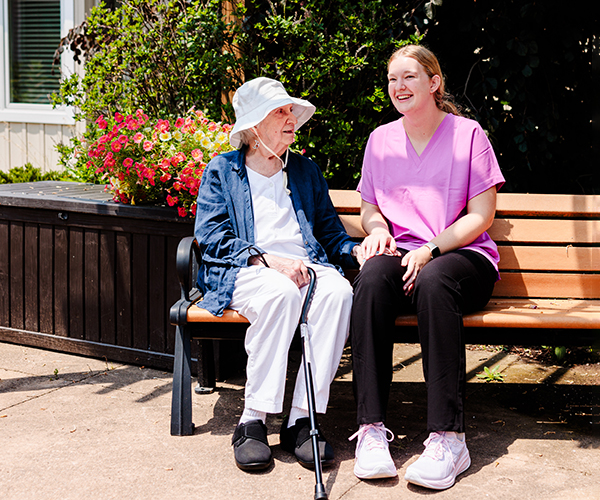“We need a place.” These were the words Christi Tripodi told her husband Mark through sobs over the phone one night. Just six months earlier, the couple had lived every parent’s worst nightmare. On May, 14, 2000, Mother’s Day, the Tripodis took their 3-year-old son Bobby to the emergency room with a high fever. The next day, they returned home without him, their lives forever changed.
Bobby was a normal, healthy boy who contracted bacterial meningitis and died suddenly. The family was devastated. “I was crying all the time every day — in my closet, in the car, at church, wherever,” Christi says, “and I kept thinking, ‘Where do people go when they go through something like this? There was nowhere to go.’”
Dealing with the pain and what it can do to a family proved difficult. “No parent expects to bury their child,” Mark says. The Tripodis participated in a monthly support group and met with a counselor once a week for about 12 sessions, the cost was $120 per session; which Christi’s parents graciously paid. However, they still felt it wasn’t enough to support them and their remaining children. “Three months after Bobby died our daugther started first grade. She was late for school at least 20 times because my husband and I couldn’t find the energy to get out of bed. As a mom, I didn’t feel like I could do anything, not even prepare a meal,” Christi says. Despite an amazing amount of family support, she needed to talk to someone who also knew what it felt like to lose a loved one. She continually wondered what people who have no family support or financial resources do to get help.
And so, what began as a “thought that wouldn’t go away,” quickly became a calling. The Tripodis wanted to create a place where families and individuals of all ages suffering after the death of a loved one could go to receive compassionate support and professional counseling with no financial obligation.
“There will always be a part of us that will hurt,” Mark says. “But we realized we weren’t alone and what we were feeling was normal. We knew there were others out there that felt the same way.”
Their calling eventually gave birth to Cornerstone of Hope, the comprehensive grief center he and Christi started in 2003 in Independence. Christi says people sometimes call it a dream. “You don’t dream having a child die and then starting a bereavement center,” she says. “We’re following God’s call to provide hope amidst the pain.”
Fourteen months after Bobby’s death the couple traveled to Portland, Ore., to the Dougy Center to learn how to organize grief groups and start their “place.” But the idea really sprouted wings after an incident at a community forum in December 2002.
Mark says a voice broke through the crowd saying, “Many people have had emotional responses to their own child’s death before. Nobody has been able to do this.” This challenge of their will inspired Christi. “I thought, Bobby means too much to me to let this just die,” she says.
Through their love for Bobby and a need to make the pain of his death purposeful, the Tripodis launched Cornerstone of Hope in 2003 from their home. It began with education outreach and Christi taking calls from her home office while raising three kids. Today, the couple has seven.
In 2004, a donation of a 4,000-square-foot office space was renovated into a grief center. Adult support groups were formed followed closely by individual counseling and, later, programs for children and teens were added. In January 2005, Mark came on board as full-time director and things took off.
Today, in addition to individual and group counseling for adults, teens and children, Cornerstone offers art therapy and incorporates journaling, photography, therapeutic games and other creative means to help people express and cope with their grief. Cornerstone also offers specialized groups for local schools, young widows and those dealing with suicide or military loss. It also organizes a summer camp day, brings in inspirational speakers and trains staff at hospitals, schools, hospices, funeral homes, churches and corporations in effectively serving the bereaved. The organization now has seven full-time employees. In 2006 the organization served more than 3,200 individuals through education and counseling.
Bobby was a normal, healthy boy who contracted bacterial meningitis and died suddenly. The family was devastated. “I was crying all the time every day — in my closet, in the car, at church, wherever,” Christi says, “and I kept thinking, ‘Where do people go when they go through something like this? There was nowhere to go.’”
Dealing with the pain and what it can do to a family proved difficult. “No parent expects to bury their child,” Mark says. The Tripodis participated in a monthly support group and met with a counselor once a week for about 12 sessions, the cost was $120 per session; which Christi’s parents graciously paid. However, they still felt it wasn’t enough to support them and their remaining children. “Three months after Bobby died our daugther started first grade. She was late for school at least 20 times because my husband and I couldn’t find the energy to get out of bed. As a mom, I didn’t feel like I could do anything, not even prepare a meal,” Christi says. Despite an amazing amount of family support, she needed to talk to someone who also knew what it felt like to lose a loved one. She continually wondered what people who have no family support or financial resources do to get help.
And so, what began as a “thought that wouldn’t go away,” quickly became a calling. The Tripodis wanted to create a place where families and individuals of all ages suffering after the death of a loved one could go to receive compassionate support and professional counseling with no financial obligation.
“There will always be a part of us that will hurt,” Mark says. “But we realized we weren’t alone and what we were feeling was normal. We knew there were others out there that felt the same way.”
Their calling eventually gave birth to Cornerstone of Hope, the comprehensive grief center he and Christi started in 2003 in Independence. Christi says people sometimes call it a dream. “You don’t dream having a child die and then starting a bereavement center,” she says. “We’re following God’s call to provide hope amidst the pain.”
Fourteen months after Bobby’s death the couple traveled to Portland, Ore., to the Dougy Center to learn how to organize grief groups and start their “place.” But the idea really sprouted wings after an incident at a community forum in December 2002.
Mark says a voice broke through the crowd saying, “Many people have had emotional responses to their own child’s death before. Nobody has been able to do this.” This challenge of their will inspired Christi. “I thought, Bobby means too much to me to let this just die,” she says.
Through their love for Bobby and a need to make the pain of his death purposeful, the Tripodis launched Cornerstone of Hope in 2003 from their home. It began with education outreach and Christi taking calls from her home office while raising three kids. Today, the couple has seven.
In 2004, a donation of a 4,000-square-foot office space was renovated into a grief center. Adult support groups were formed followed closely by individual counseling and, later, programs for children and teens were added. In January 2005, Mark came on board as full-time director and things took off.
Today, in addition to individual and group counseling for adults, teens and children, Cornerstone offers art therapy and incorporates journaling, photography, therapeutic games and other creative means to help people express and cope with their grief. Cornerstone also offers specialized groups for local schools, young widows and those dealing with suicide or military loss. It also organizes a summer camp day, brings in inspirational speakers and trains staff at hospitals, schools, hospices, funeral homes, churches and corporations in effectively serving the bereaved. The organization now has seven full-time employees. In 2006 the organization served more than 3,200 individuals through education and counseling.



